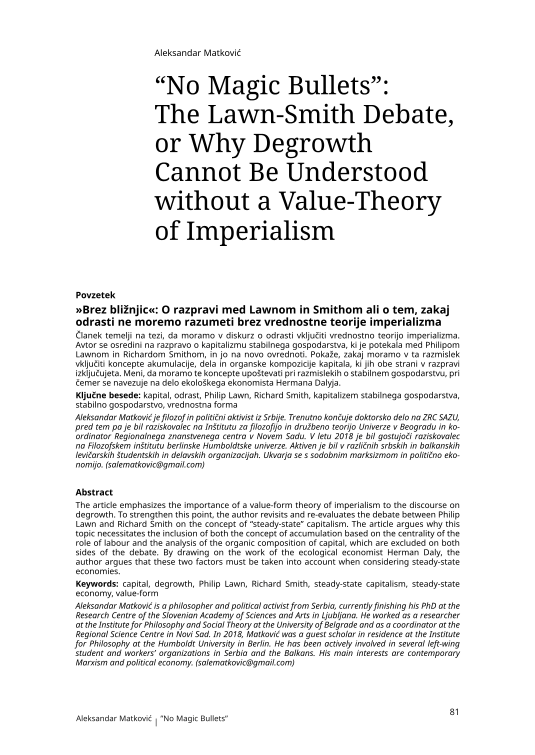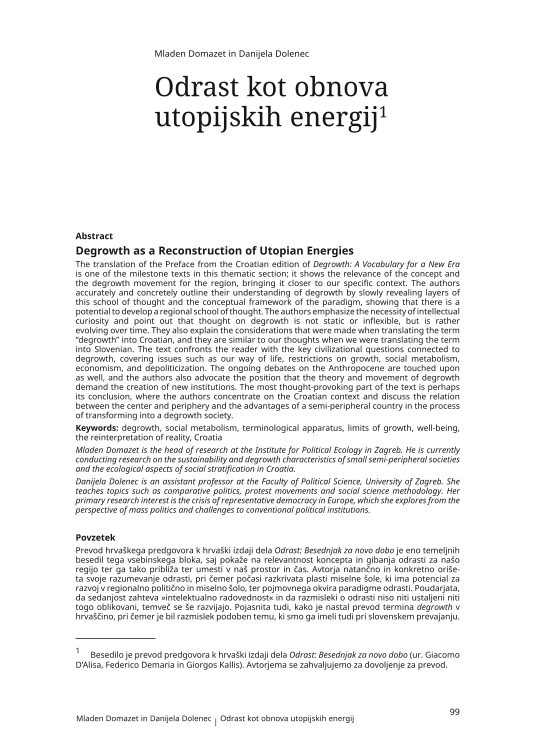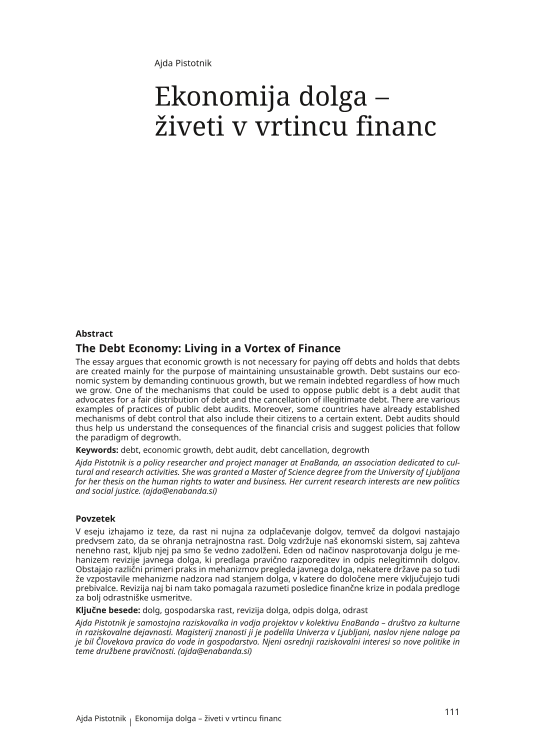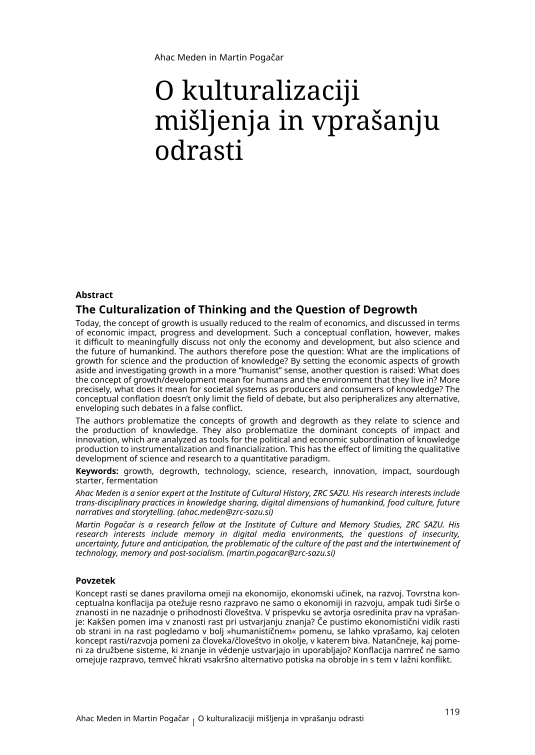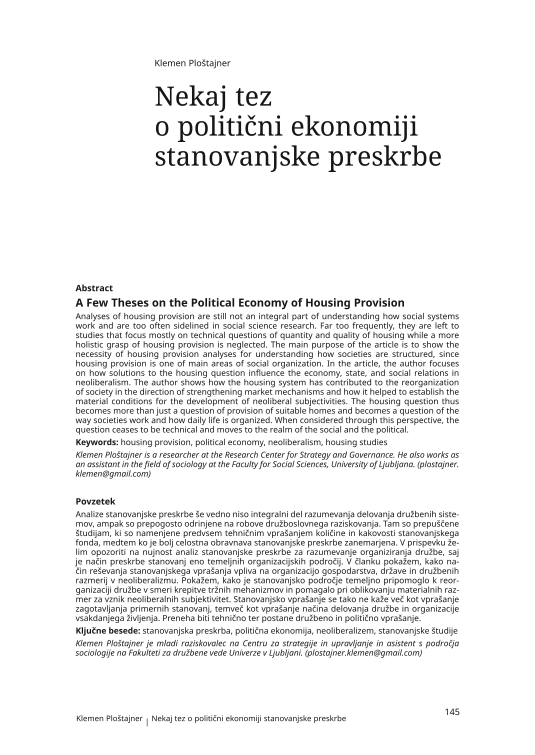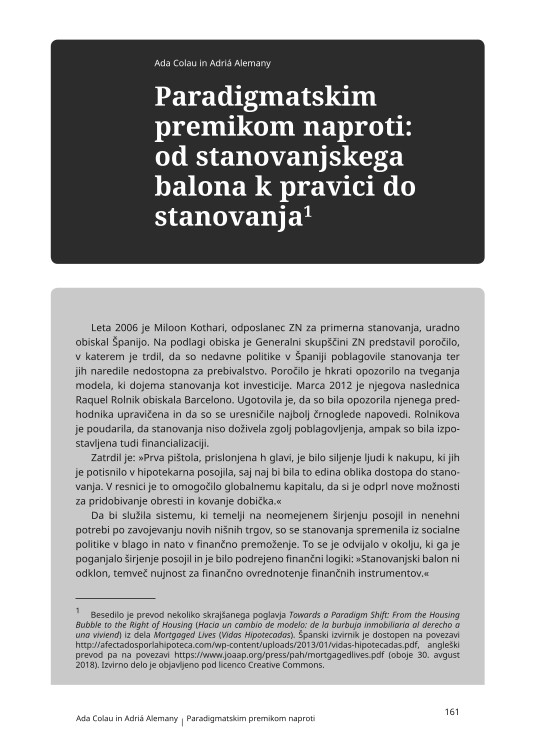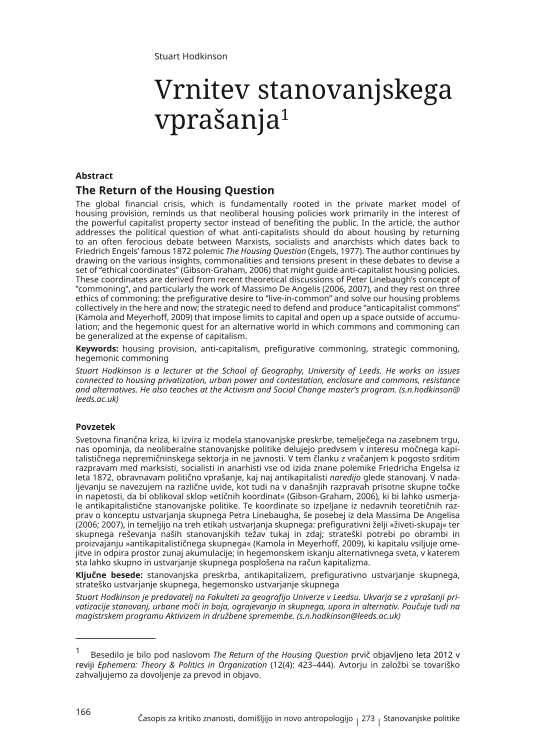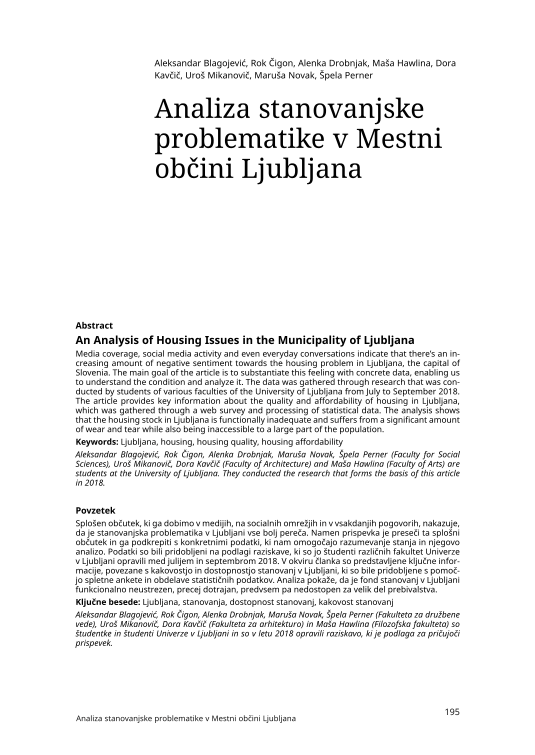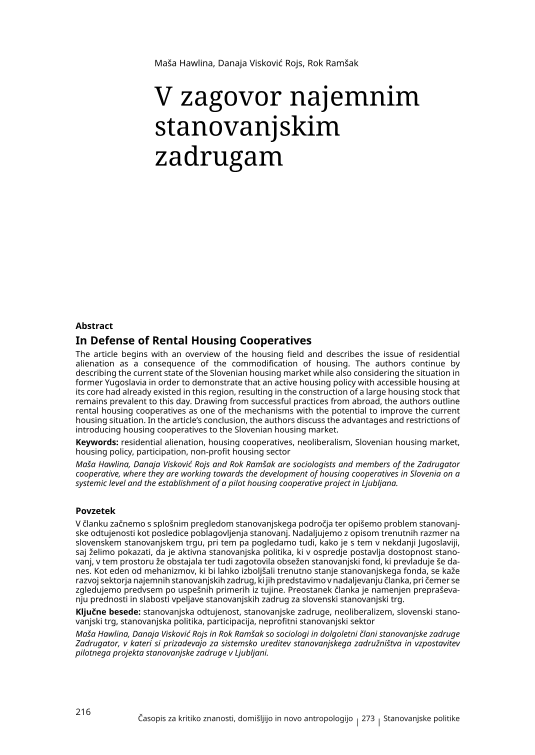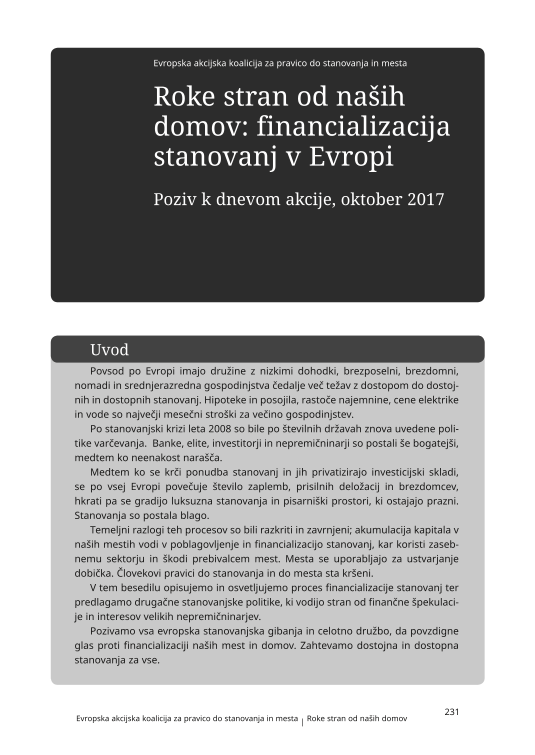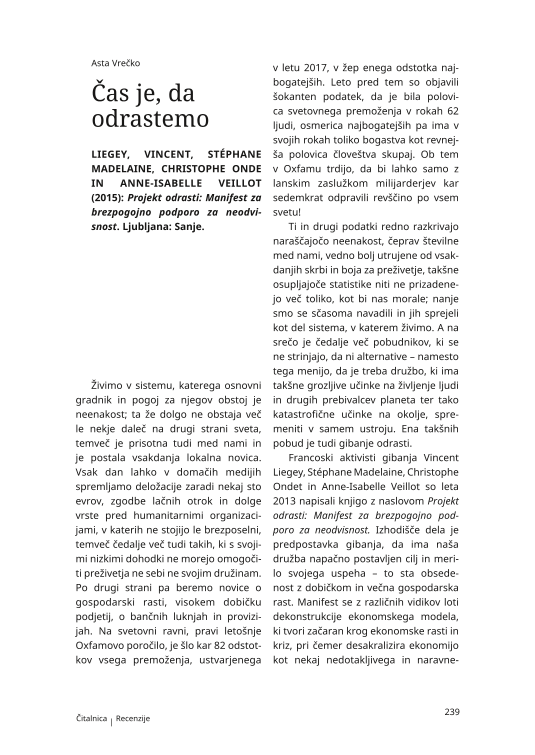Introduction to Degrowth: Welcome to the Transition to the Bright 21st Century of Degrowth
(
Leta 2016 se je začela počasi oblikovati in razvijati ideja o pripravi in objavi bloka besedil na temo odrasti v slovenskem jeziku. Postopoma (na pobudo Sare Pistotnik in Andreja Pavlišiča) so stekli pogovori z uredništvom Časopisa za kritiko znanosti, ki se je predlogu naklonjeno odzvalo, saj je zaznalo manko oziroma celo neobstoj akademskih, strokovnih in aktivističnih razprav na to temo. Povod za nastanek tega vsebinskega bloka je bila želja po odpiranju in širjenju prostora za nov, radikalnejši razmislek in drugačne imaginarije o razvoju in družbenem gibanju, ki poskuša zgraditi mirne in demokratične poti k smiselnemu in srečnemu življenju, emancipaciji ter avtonomiji (D‘Alisa, Demaria in Kallis, 2015), za razpravo o tem, kaj naj bi bila odrast, kaj nam lahko prinese ter kako naj ta razvojni koncept umestimo v času in prostoru. Do danes je bilo o odrasti napisanih nekaj časopisnih člankov, radijskih mnenjskih kolumn in dva avtorska prispevka (en predstavitveni v ČKZ in drugi o potencialih odrasti v Teoriji in praksi); prevedena je bila knjiga Projekt odrasti: Manifest za brezpogojno podporo za neodvisnost; organiziranih je bilo nekaj javnih dogodkov na to temo, oblikovala se je – s pomočjo družbenih omrežij – regionalna skupina raziskovalcev in aktivistov. V Sloveniji prav tako obstajajo nekatere prakse, pobude, prostori in gibanja, ki že delujejo v skladu z načeli odrasti, na primer tranzicijsko mesto (Trbovlje), poskusi vzpostavljanja skupnostne valute, urbani vrtovi, izmenjevalnice izdelkov in pridelkov, knjižnica reči in semen, različne zadruge (tudi stanovanjske), časovne banke, udejanjanje participativnih proračunov, izdelovanje brezplačne in »odprte« programske opreme, zagovarjanje skupnostnih trajnostnih praks, pobude za univerzalni temeljni dohodek, avtonomni (kolektivni) prostori, organizacija javnih obrokov, reciklarnice, popravljalnice različnih predmetov in tako naprej.
The essay presents three degrowth premises that relate the concept of planetary boundaries to the political vision of a decent life for everyone. First, the premise of biophysical limits challenges strategies which require the continuous growth of material and energy usage. The relevance of the premise is amplified by research which shows that certain planetary limits have already been surpassed, thus eroding the reproductive capabilities of ecosystems and decreasing their beneficial impact on society. The author presents the argument of ecological economists, who find the underlying reasons for ecological crises in the universal application of market logic to all goods and services, even when they have fundamentally different characteristics of (re)production. The essay continues by providing a degrowth rejection of the discourse of ecomodernism. Technological solutions are capable of alleviating ecological crises, but cannot resolve them because the crises stem from the inadequate economic relations between nature and society. Secondly, the premise of egalitarian economy can be used to refute a causal link between growth and well-being. By building on the first premise, the author shows that biophysical limits impose a constraint on the material preconditions of well-being. The author holds that social equality is more important for well-being than growth or material abundance. Also, temporal analyses of social inequality show that economic growth in developed countries since the neoliberal turn has coincided with growing inequality and stagnation of well-being for the majority of people. Finally, the premise of holistic economics emphasizes the crucial roles of reproductive work and reproductive ecological services, which are commonly overlooked by the existing economic system due to its strict focus on monetary exchange. The author argues that the creation of paid services often coincides with the destruction and exploitation of the reproductive part of the economy. A holistic analysis of benefits and expenses therefore casts further doubt on the causality between growth and well-being.
The global climate, the welfare state and the social ties which used to form the foundation of human relations, are now all subjugated to the imperative of growth. This is the provocative message from Giacomo D’Alisa, Federico Demaria, and Giorgos Kallis in the book Degrowth: A Vocabulary for a New Era. The authors argue that the existing model of development has not provided an answer to the growth of inequality and unemployment and that it is harmful to the only environment we have. They further state that it is incapable of eradicating poverty, and most importantly, it does not make us happier. According to them, growth is uneconomical, unjust and environmentally unsustainable. The term “degrowth” describes social dynamics, actors, alliances and processes which co-create an environment that enables a peaceful transition to a system that would tackle the drawbacks of growth. Degrowth finds its inspiration in various theoretical schools, concepts of democracy, justice, the meaning of life and well-being, ecology, criticism of development, non-violence, open border positions, feminism, and so forth. It also promotes and advocates for discussions on the state and content of public services by including and redefining the common/communal good.
Climate change and the rising global awareness of our planet’s limited resources have intensified the discussion on the necessity of a new (economic) paradigm that would oppose the hegemonic ideology of development and (infinite) growth. The concept of degrowth, which is becoming increasingly common in scientific and activist literature and practice, is based on the notion that we need to transform the foundations of modern capitalist societies. A society organized around the strategies of degrowth will have to create new principles of political organization that derive from the emancipatory and democratic processes of degrowth and strengthen them. Based on this argument, the authors hold that it is impossible to pursue degrowth within a capitalist state, since it is based on perpetuating capitalist accumulation on the foundation of growth. The second part of the article is dedicated to the possibilities for a new political organization of society based on the principles of degrowth. The authors draw from emancipatory and radical theories of democracy and politics as well as the emancipatory power that resides in the concept and practice of degrowth itself. According to the authors, degrowth theories, especially buen vivir and related modalities from the Latin-American geographical and epistemological space, have important political implications.
The author identifies and critically defines three contemporary paradigms related to different conceptualizations and approaches to environmental sustainability and economic development: the hegemonic paradigm of neoliberal market capitalism, as expressed through notions of sustainable development and green growth, and the latent paradigms of the commons and degrowth. The categorization is used to critically examine emerging alternative economy narratives and initiatives, with a particular emphasis on the concept of circular economy. The author continues by outlining possible synergies between the proposed normative understanding of initiatives that transcend the framework of the dominant paradigm – so-called “alternatives to development” (Latouche, 2009) – and methods of co-creating multi-media scenarios of alternative futures. The latter category is introduced as a range of tools that hold promise for societal empowerment, potentially enabling more inclusive, organized, critical, systemic, generative and reflexive questioning and co-creation of shared knowledge, concepts and designs for alternative socio-institutional futures and transition pathways that go beyond the post-political consensus.
The article emphasizes the importance of a value-form theory of imperialism to the discourse on degrowth. To strengthen this point, the author revisits and re-evaluates the debate between Philip Lawn and Richard Smith on the concept of “steady-state” capitalism. The article argues why this topic necessitates the inclusion of both the concept of accumulation based on the centrality of the role of labour and the analysis of the organic composition of capital, which are excluded on both sides of the debate. By drawing on the work of the ecological economist Herman Daly, the author argues that these two factors must be taken into account when considering steady-state economies.
The translation of the Preface from the Croatian edition of Degrowth: A Vocabulary for a New Era is one of the milestone texts in this thematic section; it shows the relevance of the concept and the degrowth movement for the region, bringing it closer to our specific context. The authors accurately and concretely outline their understanding of degrowth by slowly revealing layers of this school of thought and the conceptual framework of the paradigm, showing that there is a potential to develop a regional school of thought. The authors emphasize the necessity of intellectual curiosity and point out that thought on degrowth is not static or inflexible, but is rather evolving over time. They also explain the considerations that were made when translating the term “degrowth” into Croatian, and they are similar to our thoughts when we were translating the term into Slovenian. The text confronts the reader with the key civilizational questions connected to degrowth, covering issues such as our way of life, restrictions on growth, social metabolism, economism, and depoliticization. The ongoing debates on the Anthropocene are touched upon as well, and the authors also advocate the position that the theory and movement of degrowth demand the creation of new institutions. The most thought-provoking part of the text is perhaps its conclusion, where the authors concentrate on the Croatian context and discuss the relation between the center and periphery and the advantages of a semi-peripheral country in the process of transforming into a degrowth society.
The essay argues that economic growth is not necessary for paying off debts and holds that debts are created mainly for the purpose of maintaining unsustainable growth. Debt sustains our economic system by demanding continuous growth, but we remain indebted regardless of how much we grow. One of the mechanisms that could be used to oppose public debt is a debt audit that advocates for a fair distribution of debt and the cancellation of illegitimate debt. There are various examples of practices of public debt audits. Moreover, some countries have already established mechanisms of debt control that also include their citizens to a certain extent. Debt audits should thus help us understand the consequences of the financial crisis and suggest policies that follow the paradigm of degrowth.
Today, the concept of growth is usually reduced to the realm of economics, and discussed in terms of economic impact, progress and development. Such a conceptual conflation, however, makes it difficult to meaningfully discuss not only the economy and development, but also science and the future of humankind. The authors therefore pose the question: What are the implications of growth for science and the production of knowledge? By setting the economic aspects of growth aside and investigating growth in a more ‘’humanist’’ sense, another question is raised: What does the concept of growth/development mean for humans and the environment that they live in? More precisely, what does it mean for societal systems as producers and consumers of knowledge? The conceptual conflation doesn’t only limit the field of debate, but also peripheralizes any alternative, enveloping such debates in a false conflict.
The authors problematize the concepts of growth and degrowth as they relate to science and the production of knowledge. They also problematize the dominant concepts of impact and innovation, which are analyzed as tools for the political and economic subordination of knowledge production to instrumentalization and financialization. This has the effect of limiting the qualitative development of science and research to a quantitative paradigm.
Stanovanjsko vprašanje se v kapitalizmu zastavlja kot vprašanje posameznika in njegove reprodukcije. Kaže se kot vprašanje družinske politike ali graditev gospodinjskega premoženja, kot vzpon po stanovanjski lestvici ali način zagotavljanja lastnega preživetja. Na kratko, zastavlja se kot zasebna, individualna izbira, ki temelji na bolj ali manj učinkoviti uporabi finančne pismenosti ter ekonomski racionalnosti. Tisti, ki so opremljeni z znanjem, disciplino in za katere sta bistvena »jasno začrtan cilj in sprejemanje srednjeročnih in dolgoročnih odločitev« (NLB, 2018), se bodo vzpeli po stanovanjski lestvici in v ugodnem ozračju dostopnih posojil postali lastniki nepremičnine. Tistim, ki se jim sanje lastništva izmikajo, pa naj bi manjkale volja in veščine, da bi dokončno rešili stanovanjsko vprašanje na pravilen način: z nakupom primerne nepremičnine, katere prostori bodo območje zasebnosti in družinske idile ter katere vrednost naj bo temeljni vir družinskega premoženja. V takšni zastavitvi se stanovanjsko vprašanje kaže kot vprašanje morale, značaja posameznika in primernosti njegovih življenjskih izbir.
Analyses of housing provision are still not an integral part of understanding how social systems work and are too often sidelined in social science research. Far too frequently, they are left to studies that focus mostly on technical questions of quantity and quality of housing while a more holistic grasp of housing provision is neglected. The main purpose of the article is to show the necessity of housing provision analyses for understanding how societies are structured, since housing provision is one of main areas of social organization. In the article, the author focuses on how solutions to the housing question influence the economy, state, and social relations in neoliberalism. The author shows how the housing system has contributed to the reorganization of society in the direction of strengthening market mechanisms and how it helped to establish the material conditions for the development of neoliberal subjectivities. The housing question thus becomes more than just a question of provision of suitable homes and becomes a question of the way societies work and how daily life is organized. When considered through this perspective, the question ceases to be technical and moves to the realm of the social and the political.
Leta 2006 je Miloon Kothari, odposlanec ZN za primerna stanovanja, uradno obiskal Španijo. Na podlagi obiska je Generalni skupščini ZN predstavil poročilo, v katerem je trdil, da so nedavne politike v Španiji poblagovile stanovanja ter jih naredile nedostopna za prebivalstvo. Poročilo je hkrati opozorilo na tveganja modela, ki dojema stanovanja kot investicije. Marca 2012 je njegova naslednica Raquel Rolnik obiskala Barcelono. Ugotovila je, da so bila opozorila njenega predhodnika upravičena in da so se uresničile najbolj črnoglede napovedi. Rolnikova je poudarila, da stanovanja niso doživela zgolj poblagovljenja, ampak so bila izpostavljena tudi financializaciji.
The global financial crisis, which is fundamentally rooted in the private market model of housing provision, reminds us that neoliberal housing policies work primarily in the interest of the powerful capitalist property sector instead of benefiting the public. In the article, the author addresses the political question of what anti-capitalists should do about housing by returning to an often ferocious debate between Marxists, socialists and anarchists which dates back to Friedrich Engels’ famous 1872 polemic The Housing Question (Engels, 1977). The author continues by drawing on the various insights, commonalities and tensions present in these debates to devise a set of ‘’ethical coordinates’’ (Gibson-Graham, 2006) that might guide anti-capitalist housing policies. These coordinates are derived from recent theoretical discussions of Peter Linebaugh’s concept of ’’commoning’‘, and particularly the work of Massimo De Angelis (2006, 2007), and they rest on three ethics of commoning: the prefigurative desire to ‘’live-in-common’’ and solve our housing problems collectively in the here and now; the strategic need to defend and produce ‘’anticapitalist commons’’ (Kamola and Meyerhoff, 2009) that impose limits to capital and open up a space outside of accumulation; and the hegemonic quest for an alternative world in which commons and commoning can be generalized at the expense of capitalism.
Sto trideset stanovanjskih projektov in dvajset pobud tvori trdno mrežo. Vez, ki drži zavezništvo skupaj, je »Mietshäuser Syndikat« (sindikat najemnikov). Vsak stanovanjski projekt je avtonomen, je ločeno podjetje, ki ima v lasti nepremičnino. Kljub njihovi raznolikosti imajo vsi stanovanjski projekti podobno izhodišče: vsem je skupna kolektivna želja po hiši, v kateri je mogoče živeti življenje samoodločanja, brez damoklejevega meča deložacije ali buldožerja; z dostopnim življenjskim prostorom, ki ni pod stalno grožnjo prodaje ali preoblikovanja stanovanj v luksuzne kondominije1 ali pisarne. Ta želja pomeni začetek vsakega projekta. Kot vemo, navaden nepremičninski trg ne ponuja stanovanjskih stavb, v katerih bi imeli najemniki zagotovljeno dolgoročno samoodločanje. Zato na neki točki skupina pogumno izkoristi priložnost ter oblikuje združenje za nakup objekta v skladu z njenimi željami.
Media coverage, social media activity and even everyday conversations indicate that there’s an increasing amount of negative sentiment towards the housing problem in Ljubljana, the capital of Slovenia. The main goal of the article is to substantiate this feeling with concrete data, enabling us to understand the condition and analyze it. The data was gathered through research that was conducted by students of various faculties of the University of Ljubljana from July to September 2018. The article provides key information about the quality and affordability of housing in Ljubljana, which was gathered through a web survey and processing of statistical data. The analysis shows that the housing stock in Ljubljana is functionally inadequate and suffers from a significant amount of wear and tear while also being inaccessible to a large part of the population.
Smo leta 2013 v Londonu ustanovljena mreža skupin, ki se bori za pravičnost na stanovanjskem področju.
Stanovanja: Skupine v naši mreži delujejo na širokem spektru stanovanjskih vprašanj, ki vključujejo, a niso omejena na zasebni najem, socialna stanovanja, skvotanje, dostop do dodatkov, brezdomstvo in zadružna stanovanja.
Radikalno: Menimo, da nas konvencionalna politika ne predstavlja, in se zato organiziramo kot gibanje za stanovanjsko pravičnost od spodaj, ki temelji na vsakdanjih stanovanjskih potrebah ljudi. Podpiramo raznolike taktike, vključno z neposredno akcijo.
Mreža: Mreža je horizontalna združba; »skupina skupin«. Povezujemo se in sodelujemo onkraj stanovanjskih statusov, znotraj in onkraj lokalnih sosesk.
The article begins with an overview of the housing field and describes the issue of residential alienation as a consequence of the commodification of housing. The authors continue by describing the current state of the Slovenian housing market while also considering the situation in former Yugoslavia in order to demonstrate that an active housing policy with accessible housing at its core had already existed in this region, resulting in the construction of a large housing stock that remains prevalent to this day. Drawing from successful practices from abroad, the authors outline rental housing cooperatives as one of the mechanisms with the potential to improve the current housing situation. In the article’s conclusion, the authors discuss the advantages and restrictions of introducing housing cooperatives to the Slovenian housing market.
Povsod po Evropi imajo družine z nizkimi dohodki, brezposelni, brezdomni, nomadi in srednjerazredna gospodinjstva čedalje več težav z dostopom do dostojnih in dostopnih stanovanj. Hipoteke in posojila, rastoče najemnine, cene elektrike in vode so največji mesečni stroški za večino gospodinjstev.
Po stanovanjski krizi leta 2008 so bile po številnih državah znova uvedene politike varčevanja. Banke, elite, investitorji in nepremičninarji so postali še bogatejši, medtem ko neenakost narašča.
Medtem ko se krči ponudba stanovanj in jih privatizirajo investicijski skladi, se po vsej Evropi povečuje število zaplemb, prisilnih deložacij in brezdomcev, hkrati pa se gradijo luksuzna stanovanja in pisarniški prostori, ki ostajajo prazni. Stanovanja so postala blago.
Temeljni razlogi teh procesov so bili razkriti in zavrnjeni; akumulacija kapitala v naših mestih vodi v poblagovljenje in financializacijo stanovanj, kar koristi zasebnemu sektorju in škodi prebivalcem mest. Mesta se uporabljajo za ustvarjanje dobička. Človekovi pravici do stanovanja in do mesta sta kršeni.
V tem besedilu opisujemo in osvetljujemo proces financializacije stanovanj ter predlagamo drugačne stanovanjske politike, ki vodijo stran od finančne špekulacije in interesov velikih nepremičninarjev.
Pozivamo vsa evropska stanovanjska gibanja in celotno družbo, da povzdigne glas proti financializaciji naših mest in domov. Zahtevamo dostojna in dostopna stanovanja za vse.
Liegey, Vincent, Stéphane Madelaine, Christophe Onde in Anne-Isabelle Veillot (2015) : Projekt odrasti: Manifest za brezpogojno podporo za neodvisnost. Ljubljana: Sanje
Živimo v sistemu, katerega osnovni gradnik in pogoj za njegov obstoj je neenakost; ta že dolgo ne obstaja več le nekje daleč na drugi strani sveta, temveč je prisotna tudi med nami in je postala vsakdanja lokalna novica. Vsak dan lahko v domačih medijih spremljamo deložacije zaradi nekaj sto evrov, zgodbe lačnih otrok in dolge vrste pred humanitarnimi organizacijami, v katerih ne stojijo le brezposelni, temveč čedalje več tudi takih, ki s svojimi nizkimi dohodki ne morejo omogočiti preživetja ne sebi ne svojim družinam. Po drugi strani pa beremo novice o gospodarski rasti, visokem dobičku podjetij, o bančnih luknjah in provizijah. Na svetovni ravni, pravi letošnje Oxfamovo poročilo, je šlo kar 82 odstotkov vsega premoženja, ustvarjenega v letu 2017, v žep enega odstotka najbogatejših. Leto pred tem so objavili šokanten podatek, da je bila polovica svetovnega premoženja v rokah 62 ljudi, osmerica najbogatejših pa ima v svojih rokah toliko bogastva kot revnejša polovica človeštva skupaj. Ob tem v Oxfamu trdijo, da bi lahko samo z lanskim zaslužkom milijarderjev kar sedemkrat odpravili revščino po vsem svetu!









